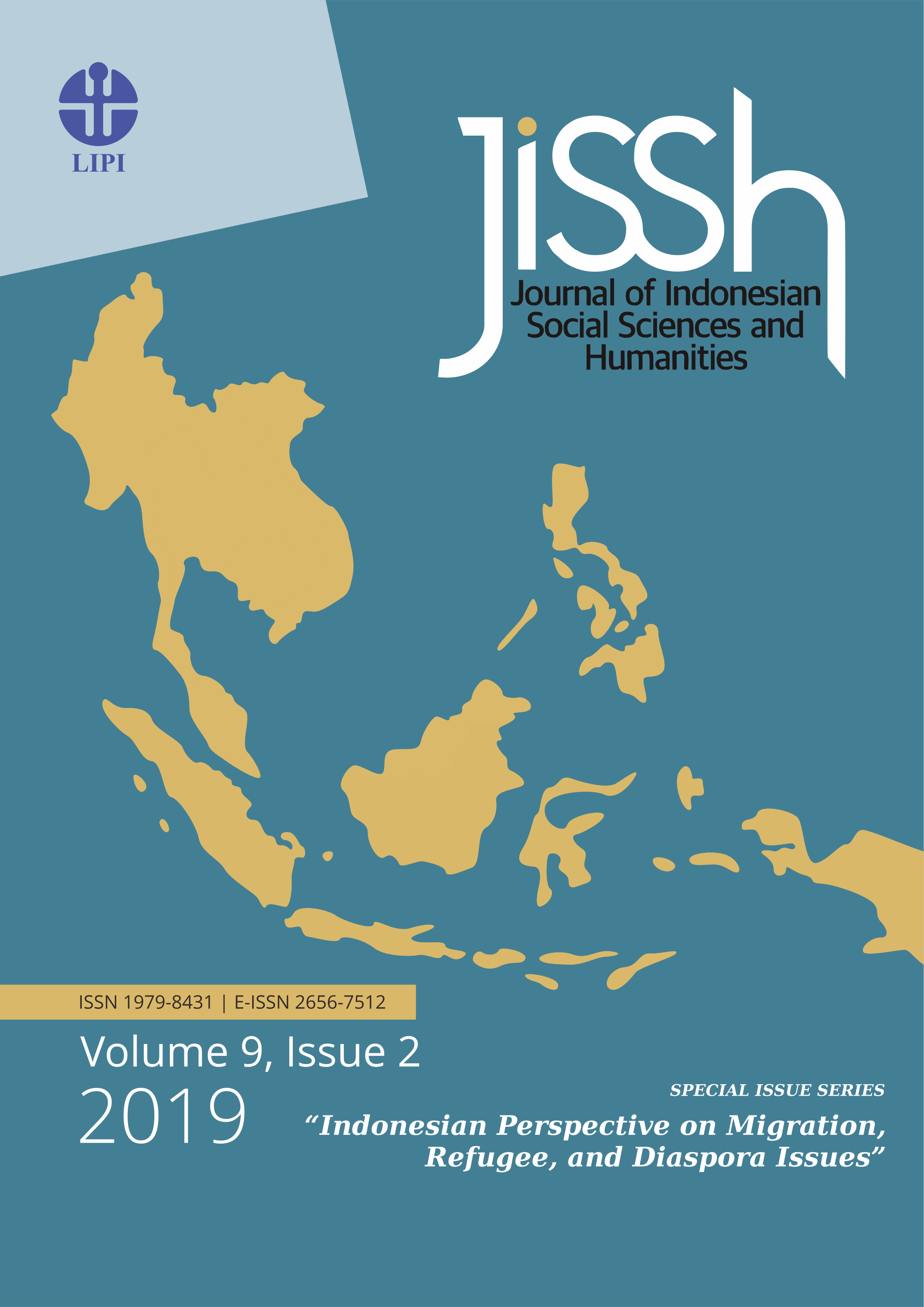Mapping Indonesian Muslim Organizations In The Netherlands
Keywords:
Indonesian diaspora, Muslim organizations, The NetherlandsAbstract
Since few years ago, Indonesian government have been concerning to gain many benefits from Indonesian diaspora in various regions in the world. There are many events and agendas provided by the government which are aimed to embrace many Indonesian diaspora for giving a great contribution towards their homelands. However, its vision for gaining attention from Indonesian diaspora tends to low because the government do not have Indonesian diaspora maps in details, comprehensive, as well as described by historical trajectory. This paper aims to understand the contribution of Indonesian Muslim diaspora by mapping the role of Indonesian Muslim Organizations in the Netherlands by socio-historical perspectives. The main reasons of the Netherlands as locus of this research are; Indonesian Muslim diaspora are the first actors who promoted Islam faces in this country since 1920s and it also was acknowledged as one of the highest Muslim populated countries in Europe. Afterwards, this paper shows that there are numerous Indonesian Muslim organizations in the Netherlands from different perspectives, mazhabs, and backgrounds. Even though the government did not pillarize Indonesian Muslim organizations, albeit most of them have strong connections with some Muslim organizations in Indonesia, starting from Nahdhatul Ulama (NU) until Salafist Movement.
References
Albrecht, S. (2016). Searching for the ‘Homeland’ of Islam: Concepts of Diaspora in Contemporary Islamic Discourse on Muslims in the West. Journal of Muslims in Europe, 5(1), 106–131. https://doi.org/10.1163/22117954-12341321
Albrecht, S., Boos, T., Deffner, V., Gebauer, M., & Araújo, S. H. de. (2016). Editorial: Conceptualising ‘Muslim Diaspora.’ Journal of Muslims in Europe, 5(1), 1–9. https://doi.org/10.1163/22117954-12341316
Baumann, M. (2000). Diaspora: Genealogies of Semantics and Transcultural Comparison. Numen, 47(3), 313–337. JSTOR.
Central Intelligence Agency. (2019). The CIA World Factbook 2019. Central Intelligence Agency.
Gusnelly. (2018). Kebebasan Beragama dan Hukum Penodaan Agama di Inggris. Dalam A. Mudzakir, Gusnelly, E. Budiwanti, & P. N. Mulyasari (Ed.), Menuju Masyarakat Pasca-Sekuler: Agama dan Kewarganegaraan di Inggris. Penerbit Ombak. http://penerbitombak.com/product/menuju-masyarakat-pasca-sekuler-agama-dan-kewarganegaraan-di-inggris/
Institute for Multicultural Affairs. (2010). The position of Muslims in the Netherlands: Facts and Figures. FORUM – Institute for Multicultural Affairs.
Muhidin, S., & Utomo, A. (2016). Global Indonesian Diaspora: How many are there and where are they? JAS (Journal of ASEAN Studies), 3(2), 93–101. https://doi.org/10.21512/jas.v3i2.847
Pew Research Center. (2017, November 29). Muslim Population Growth in Europe. Pew Research Center’s Religion & Public Life Project. https://www.pewforum.org/2017/11/29/europes-growing-muslim-population/
Poeze, H. A., Dijk, C., & Meulen, I. van der. (2008). Di Negeri Penjajah: Orang Indonesia di Negeri Belanda, 1600-1950. Kepustakaan Populer Gramedia.
Rath, J., Sunier, T., & Meyer, A. (1997). Islam in The Netherlands: The Establishment of Islamic Institutions in A De-Pillarizing Society. Tijdschrift Voor Economische En Sociale Geografie / Journal of Economic and Social Geography, 88(4), 389–395.
Ryad, U. (2012). Among the Believers in the Land of the Colonizer: Mohammed Ali van Beetem’s Role Among the Indonesian Community in the Netherlands in the Interwar Period. Journal of Religion in Europe, 5(2), 273–310. https://doi.org/10.1163/187489212X634780
Saiman, A. (2019, Mei 3). An Overview of Indonesian Muslim Diaspora. Presentation of Director of Center of Policy Analysis and Development on Asia Pacific and Africa Regions, Ministry of Foreign Affairs of the Republic of Indonesia, Jakarta.
Siddiqui, Z., & Tejada, G. (2014). Development and Highly Skilled Migrants: Perspectives from the Indian Diaspora and Returnees. International Development Policy | Revue internationale de politique de développement, 5(5.2), Article 2. https://doi.org/10.4000/poldev.1720
Stowasser, B. F. (2002). The Turks in Germany: From Sojourners to Citizens. Dalam Y. Y. Haddad (Ed.), Muslims in the West: From Sojourners to Citizens (1 edition). Oxford University Press USA.
Stutje, K. (2016). Indonesian Islam in Interwar Europe: Muslim Organizations in the Netherlands and Beyond. Muslims in Interwar Europe, 125–150. https://doi.org/10.1163/9789004301979_007
Sujadi. (2017). Persatuan Pemuda Muslim Se-Eropa: Identity, Encouragement for giving, and Network, 1971-2009 [Doctoral Thesis, Leiden University]. https://openaccess.leidenuniv.nl/handle/1887/50645
UN DESA. (2013). International migrant stock 2013: By destination and origin. United Nations Department of Economic and Social Affairs. https://www.un.org/en/development/desa/population/migration/data/estimates2/estimatesorigin.asp
World Bank. (2016). Migration and Remittances Factbook 2016, Third Edition. World Bank. https://openknowledge.worldbank.org/handle/10986/23743
Focus Group Discussion with PCINU’s stakeholders, March 10th 2019
Interview with Didin Fahruddin, March 11th 2019 in The Hague
Interview with Nico Landman, March 12th 2019 in Utrecht
Interview with Marko Lubeek, March 13th 2019 in Rotterdam
Interview with Hamdi Rofiefuddin, March 20th 2019 in The Hague
Downloads
Published
Issue
Section
License

This work is licensed under a Creative Commons Attribution-ShareAlike 4.0 International License.
Authors who publish with this journal agree to the following terms:
1. Authors retain copyright and grant the journal right of first publication with the work simultaneously licensed under an Attribution-ShareAlike 4.0 International (CC BY-SA 4.0) license. This license allows others to remix, adapt, and build upon the work, as long as they credit the author and license their new creations under the same terms.
2. Authors may enter into separate, additional contractual arrangements for the non-exclusive distribution of the journal’s published version of the work (e.g., posting it to an institutional repository or including it in a book), provided there is an acknowledgment of its initial publication in this journal.
3. Authors are permitted and encouraged to post their work online (e.g., in institutional repositories or on their personal website) prior to and during the submission process, as this can lead to productive exchanges and increase citations of the published work (See The Effect of Open Access ).


















